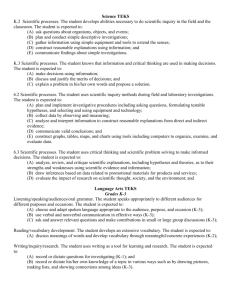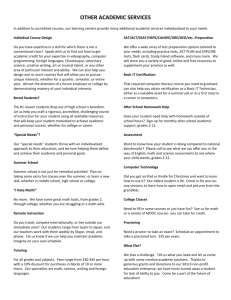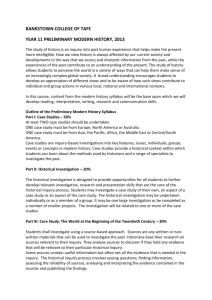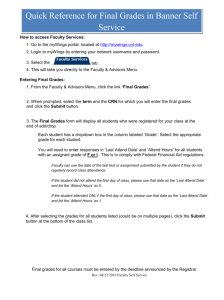Science Standard 1
advertisement
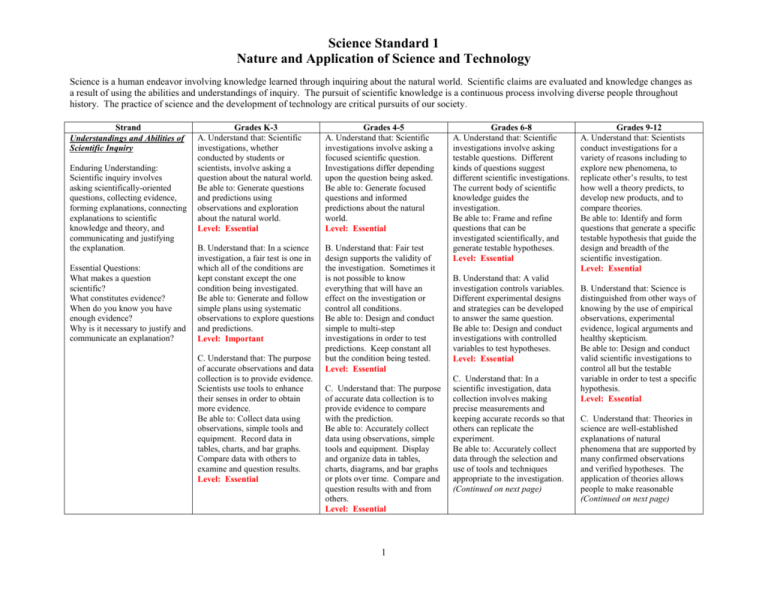
Science Standard 1 Nature and Application of Science and Technology Science is a human endeavor involving knowledge learned through inquiring about the natural world. Scientific claims are evaluated and knowledge changes as a result of using the abilities and understandings of inquiry. The pursuit of scientific knowledge is a continuous process involving diverse people throughout history. The practice of science and the development of technology are critical pursuits of our society . Strand Understandings and Abilities of Scientific Inquiry Enduring Understanding: Scientific inquiry involves asking scientifically-oriented questions, collecting evidence, forming explanations, connecting explanations to scientific knowledge and theory, and communicating and justifying the explanation. Essential Questions: What makes a question scientific? What constitutes evidence? When do you know you have enough evidence? Why is it necessary to justify and communicate an explanation? Grades K-3 A. Understand that: Scientific investigations, whether conducted by students or scientists, involve asking a question about the natural world. Be able to: Generate questions and predictions using observations and exploration about the natural world. Level: Essential Grades 4-5 A. Understand that: Scientific investigations involve asking a focused scientific question. Investigations differ depending upon the question being asked. Be able to: Generate focused questions and informed predictions about the natural world. Level: Essential B. Understand that: In a science investigation, a fair test is one in which all of the conditions are kept constant except the one condition being investigated. Be able to: Generate and follow simple plans using systematic observations to explore questions and predictions. Level: Important B. Understand that: Fair test design supports the validity of the investigation. Sometimes it is not possible to know everything that will have an effect on the investigation or control all conditions. Be able to: Design and conduct simple to multi-step investigations in order to test predictions. Keep constant all but the condition being tested. Level: Essential C. Understand that: The purpose of accurate observations and data collection is to provide evidence. Scientists use tools to enhance their senses in order to obtain more evidence. Be able to: Collect data using observations, simple tools and equipment. Record data in tables, charts, and bar graphs. Compare data with others to examine and question results. Level: Essential C. Understand that: The purpose of accurate data collection is to provide evidence to compare with the prediction. Be able to: Accurately collect data using observations, simple tools and equipment. Display and organize data in tables, charts, diagrams, and bar graphs or plots over time. Compare and question results with and from others. Level: Essential 1 Grades 6-8 A. Understand that: Scientific investigations involve asking testable questions. Different kinds of questions suggest different scientific investigations. The current body of scientific knowledge guides the investigation. Be able to: Frame and refine questions that can be investigated scientifically, and generate testable hypotheses. Level: Essential B. Understand that: A valid investigation controls variables. Different experimental designs and strategies can be developed to answer the same question. Be able to: Design and conduct investigations with controlled variables to test hypotheses. Level: Essential C. Understand that: In a scientific investigation, data collection involves making precise measurements and keeping accurate records so that others can replicate the experiment. Be able to: Accurately collect data through the selection and use of tools and techniques appropriate to the investigation. (Continued on next page) Grades 9-12 A. Understand that: Scientists conduct investigations for a variety of reasons including to explore new phenomena, to replicate other’s results, to test how well a theory predicts, to develop new products, and to compare theories. Be able to: Identify and form questions that generate a specific testable hypothesis that guide the design and breadth of the scientific investigation. Level: Essential B. Understand that: Science is distinguished from other ways of knowing by the use of empirical observations, experimental evidence, logical arguments and healthy skepticism. Be able to: Design and conduct valid scientific investigations to control all but the testable variable in order to test a specific hypothesis. Level: Essential C. Understand that: Theories in science are well-established explanations of natural phenomena that are supported by many confirmed observations and verified hypotheses. The application of theories allows people to make reasonable (Continued on next page) Science Standard 1 Nature and Application of Science and Technology Science is a human endeavor involving knowledge learned through inquiring about the natural world. Scientific claims are evaluated and knowledge changes as a result of using the abilities and understandings of inquiry. The pursuit of scientific knowledge is a continuous process involving diverse people throughout history. The practice of science and the development of technology are critical pursuits of our society. Strand Understandings and Abilities of Scientific Inquiry (Continued from previous page) Grades K-3 D. Understand that: Scientists use observations from investigations and knowledge that is already known to develop an explanation. Be able to: Construct a simple explanation by analyzing observational data. Revise the explanation when given new evidence or information gained from other resources or from further investigation. Level: Essential E. Understand that: The purpose of communicating with others is to share evidence and conclusions. Scientists communicate the results of their investigations to others. Be able to: Share simple plans, data, and explanations with an audience and justify the results using the evidence from the investigation. Level: Important F. Understand that: The use of mathematics, reading, writing, and technology are important in conducting scientific inquiries. Be able to: Use mathematics, reading, writing, and technology when conducting an investigation and communicating the results. Level: Important Grades 4-5 D. Understand that: The body of scientific knowledge grows as scientists ask questions, conduct investigations, develop explanations and compare results with what is already known. Be able to: Construct a reasonable explanation by analyzing evidence from the data. Revise the explanation after comparing results with other sources or after further investigation. Level: Essential E. Understand that: The purpose of communicating is to share and justify results. Scientists communicate their results to others, including the details that allow others to replicate the results. Be able to: Communicate procedures, data, and explanations to a variety of audiences. Justify the results by using evidence to form an argument. Level: Essential Grades 6-8 Construct tables, diagrams and graphs, showing relationships between two variables, to display and facilitate analysis of data. Compare and question results with and from other students. Level: Essential D. Understand that: There is much experimental and observational evidence that supports a large body of knowledge. The scientific community supports known information until new experimental evidence arises that does not match existing explanations. This leads to the evolution of the scientific body of knowledge. Be able to: Form explanations based on accurate and logical analysis of evidence. Revise the explanation using alternative descriptions, predictions, models and knowledge from other sources as well as results of further investigation. Level: Essential E. Understand that: Evaluating the explanations proposed by others involves examining and (Continued on next page) 2 Grades 9-12 predictions. Theories may be amended to become more complete with the introduction of new evidence. Be able to: Collect accurate and precise data through the selection and use of tools and technologies appropriate to the investigations. Display and organize data through the use of tables, diagrams, graphs, and other organizers that allow analysis and comparison with known information and allow for replication of results. Level: Essential D. Understand that: Investigating most real-world problems requires building upon previous scientific findings and cooperation among individuals with knowledge and expertise from a variety of scientific fields. The results of scientific studies are considered valid when subjected to critical review where contradictions are resolved and the explanation is confirmed. (Continued on next page) Science Standard 1 Nature and Application of Science and Technology Science is a human endeavor involving knowledge learned through inquiring about the natural world. Scientific claims are evaluated and knowledge changes as a result of using the abilities and understandings of inquiry. The pursuit of scientific knowledge is a continuous process involving diverse people throughout history. The practice of science and the development of technology are critical pursuits of our society. Strand Understandings and Abilities of Scientific Inquiry (Continued from previous page) Grades K-3 Grades 4-5 F. Understand that: The use of mathematics, reading, writing, and technology are important in conducting scientific inquiries. Be able to: Use mathematics, reading, writing, and technology when conducting scientific inquiries. Level: Important Grades 6-8 comparing evidence, identifying faulty reasoning, pointing out statements that go beyond the evidence, and suggesting alternative explanations for the same observations. Conflicting data or conflicting interpretations of the same data suggest the need for further investigation. Continued investigation can lead to greater understanding and resolution of the conflict. Be able to: Communicate scientific procedures, data, and explanations to enable the replication of results. Use computer technology to assist in communicating these results. Critical review is important in the analysis of these results. Level: Important F. Understand that: Scientific habits of mind and other sources of knowledge and skills are essential to scientific inquiry. Habits of mind include tolerance of ambiguity, skepticism, openness to new ideas, and objectivity. Other knowledge and skills include mathematics, reading, writing, and technology. Be able to: Use mathematics, reading, writing, and technology when conducting scientific inquiries. Level: Important 3 Grades 9-12 Be able to: Construct logical scientific explanations and present arguments which defend proposed explanations through the use of closely examined evidence. Level: Essential E. Understand that: In communicating and defending the results of scientific inquiry, arguments must be logical and demonstrate connections between natural phenomena, investigations, and the historical body of scientific knowledge. (American Association for the Advancement of Science, 2001) Be able to: Communicate and defend the results of scientific investigations using logical arguments and connections with the known body of scientific information. Level: Essential F. Understand that: Knowledge and skill from sources other than science are essential to scientific inquiry. These include mathematics, reading, writing, and technology. Be able to: Use mathematics, reading, writing and technology when conducting scientific inquiries. Level: Essential Science Standard 1 Nature and Application of Science and Technology Science is a human endeavor involving knowledge learned through inquiring about the natural world. Scientific claims are evaluated and knowledge changes as a result of using the abilities and understandings of inquiry. The pursuit of scientific knowledge is a continuous process involving diverse people throughout history. The practice of science and the development of technology are critical pursuits of our society. Strand Science, Technology, and Society Enduring Understanding: The development of technology and advancement in science influence and drive each other forward. Essential Question: How do science and technology influence each other? Grades K-3 A. People have invented new technologies to solve problems. Level: Compact B. Tools are useful in science to help gather data for observations and measurements and provide a safe means of conducting an investigation. Level: Important Grades 4-5 A. Science and technology are related. Technology provides the tools needed for science to investigate questions and may provide solutions to society’s problems, wants, or needs. Not all technological solutions are effective, uniformly beneficial, or equally available to everyone. Level: Compact Grades 6-8 A. Advances in technology can expand the body of scientific knowledge. Technological tools allow people to observe objects and phenomena that otherwise would not be possible. Technology enhances the quality, accuracy, speed and analysis of data gathered. Level: Important B. Science and technology in society are driven by the following factors: economical, political, cultural, social, and environmental. Increased scientific knowledge and technology create changes that can be beneficial or detrimental to individuals or society through impact on human health and the environment. Level: Compact 4 Grades 9-12 A. The pursuit of science can generate the need for advanced technology. Advanced technology, in turn, can provide the opportunity to pursue new scientific knowledge. Level: Important B. The social, economic, and political forces of a society have a significant influence on what science and technology programs are pursued, funded, and implemented. Level: Important Science Standard 1 Nature and Application of Science and Technology Science is a human endeavor involving knowledge learned through inquiring about the natural world. Scientific claims are evaluated and knowledge changes as a result of using the abilities and understandings of inquiry. The pursuit of scientific knowledge is a continuous process involving diverse people throughout history. The practice of science and the development of technology are critical pursuits of our society. Strand History and Context of Science Enduring Understanding: Understanding past processes and contributions is essential in building scientific knowledge. Essential Question: How have past scientific contributions influenced current scientific understanding of the world? What do we mean in science when we say that we stand on the shoulders of giants? Grades K-3 A. People from all parts of the world practice science and make many important scientific contributions. Level: Compact Grades 4-5 A. Contributions by individuals have been essential in advancing the body of scientific knowledge. Level: Compact B. Much has been learned about the natural world but there is still much to understand. Level: Compact 5 Grades 6-8 A. Over the course of human history, contributions to science have been made by different people from different cultures. Studying some of these contributions and how they came about provides insight into the expansion of scientific knowledge. Level: Compact Grades 9-12 A. New disciplines of science emerge as older disciplines interface into an integrated study of the natural world. As the body of scientific knowledge grows, the boundaries between individual disciplines diminish. Level: Compact


